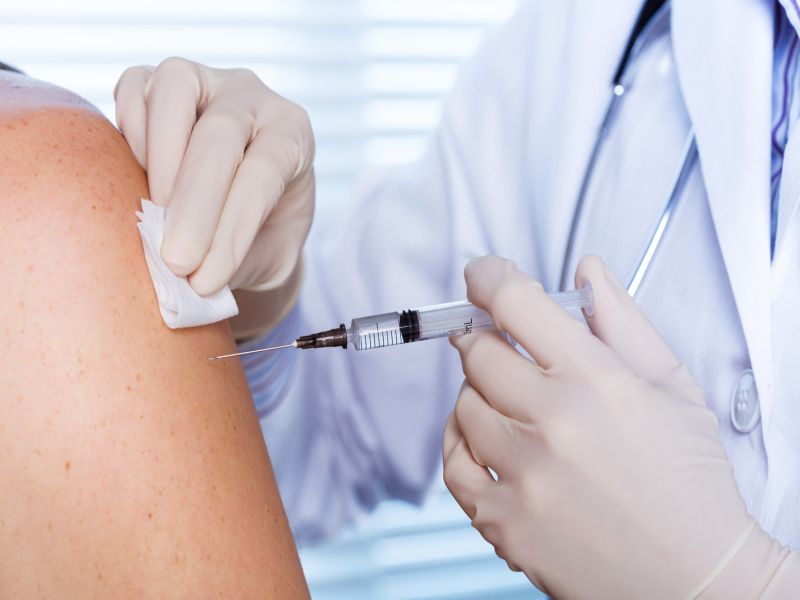A vaccine against the sexually transmitted disease chlamydia appears safe and potentially effective, an early trial suggests.
The phase 1 study included 35 healthy women. Those who were given injections of two possible vaccines developed antibodies to the chlamydia bacteria, but a lot more testing is needed before the vaccine would be ready for the public, the researchers added."An effective vaccine against chlamydia would have enormous public health and economic impact," said lead researcher Frank Follmann. He is director of infectious disease immunology at the Center for Vaccine Research at Statens Serum Institute in Copenhagen, Denmark.
"This is a promising first step on the road to develop a vaccine," he said. "The success of the HPV [human papillomavirus] vaccine has shown us how effective vaccination can be against a sexually transmitted infection. We hope to do the same with chlamydia and, in the long term, combine the two vaccines."
The results of this study are encouraging, and larger trials are planned, Follmann said. "The goal is to vaccinate girls [and potentially boys] before they become sexually active," he explained.
One expert said the findings show promise.
"Developing a vaccine against chlamydia has been challenging," said Fred Wyand, a spokesman for the American Sexual Health Association. "The study gives reason to be hopeful that vaccination to prevent chlamydia will someday be possible, but that goal lies in the future."
In the meantime, Wyand added, "it's important to keep in mind that chlamydia is easily diagnosed, treated and cured. This is why it's so important to test, and experts like the CDC recommend annual chlamydia testing for all sexually active women age 25 and under."
In the vaccine trial, the women were randomly assigned to one of two different vaccines or a placebo.
All of the women who received the vaccine produced antibodies to chlamydia, but one of the vaccines, called CTH522:CAF01, produced nearly six times more antibodies than the other vaccine, the investigators found.
That's the formula the researchers think should be pursued. From these results, however, it isn't a certainty that the vaccine will protect someone from chlamydia or if the protection will last over the long term, the researchers noted.
The most common side effect was reactions at the injection site, including pain and tenderness. These were mild and lasted only two to four days.
"Research shows that the combination of antibodies and T-cells can protect against chlamydia, but the vaccine needs to be tested in larger and more long-term clinical trials to see if it protects against infection in humans," Follmann said.
Chlamydia is the most common sexually transmitted infection in the world. It's caused by bacteria and infects 131 million people a year. It is mostly found in teens and young adults.
Because most cases don't have symptoms, the actual number of people infected might be much higher, the researchers said.
Both men and women can get the infection. Women get chlamydia in the cervix, rectum or throat. Men can get it inside the penis, rectum or throat. Chlamydia can be easily cured with antibiotics.
But one in six women who get the infection will suffer from pelvic inflammatory disease, which can cause chronic pelvic pain, infertility or ectopic pregnancy, where the egg is implanted outside the uterus, in the oviduct or fallopian tube.
Chlamydia is also associated with a likelihood of contracting other sexually transmitted infections, such as gonorrhea and HIV.
Women who are infected with chlamydia during pregnancy also have a higher risk for miscarriage, stillbirth and preterm birth.
The report was published online Aug. 12 in The Lancet Infectious Diseases.
Dr. Toni Darville is a professor of pediatrics, microbiology and immunology at the University of North Carolina at Chapel Hill. "Although clinical vaccine testing for chlamydia is in its infancy, this trial suggests optimism for the future," she said.
Questions that remain include whether the vaccine could protect women against upper reproductive tract damage, even if it can't prevent infection, she added.
"If the immune cells can kill the chlamydia infection before it reaches the oviducts or fallopian tubes, it could provide protection from the disease despite infection," said Darville, who co-wrote an accompanying editorial.
Darville also wonders if the vaccine were given to both men and women if it could protect women, who bear the brunt of the disease, from the infection.
Questions that remain include whether the vaccine could protect women against upper reproductive tract damage, even if it can't prevent infection, she added.
"If the immune cells can kill the chlamydia infection before it reaches the oviducts or fallopian tubes, it could provide protection from the disease despite infection," said Darville, who co-wrote an accompanying editorial.
Darville also wonders if the vaccine were given to both men and women if it could protect women, who bear the brunt of the disease, from the infection.










0 Comments